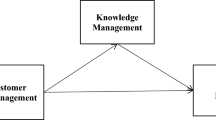Abstract
Customer Relationship Management systems are one of the most significant determinants to maximize sales in any business domain. In the process of CRM, the important step after targeting a lead is to convert these leads into actual customers. In the current CRM system, depending on the lead score, the lead is projected as a potential customer. The paper proposes the application of fuzzy logic in the Customer Relationship Management systems to get the prospects of how potential a lead is to become a customer based on some of the factors that involves the interaction between the lead and the business domain. Fuzzy logic approach is mainly used to identify the important leads, who have the potential to increase the future sales of the business.
Access this chapter
Tax calculation will be finalised at checkout
Purchases are for personal use only
Similar content being viewed by others
References
Ullah, Z., Al-Mudimigh, A.S.: CRM scorecard measurement: the case for the banking sector in Saudi Arabia. In: 2009 Third UKSim European Symposium on Computer Modeling and Simulation, pp. 269–273 (2009)
Daif, A., Eljamiy, F., Azzouazi, M., Marzak, A.: Review current CRM architectures and introducing new adapted architecture to Big Data. In: 2015 International Conference on Computing, Communication and Security (ICCCS), pp. 1–7 (2015)
Yu, T., Zhou, J., Zhang, Y., Dong, S., Wang, W.: Research on CRM performance evaluation based on fuzzy comprehensive algorithm. In: 2008 International Conference on Information Management, Innovation Management and Industrial Engineering, pp. 329–334 (2008)
Khan, N., Khan, F.: Fuzzy based decision making for promotional marketing campaigns. Int. J. Fuzzy Logic Syst. (IJFLS) 3(1), 1148–1158 (2006)
Zhou, J., Yu, T., Zhang, Y., Dong, S., Wang, W.: System of CRM performance evaluation based on fuzzy comprehensive algorithm. In: 2008 International Conference on Information Management, Innovation Management and Industrial Engineering, pp. 382–385 (2008)
Hu, G.L.: Performance evaluation of enterprise CRM system based on grey-fuzzy theory. In: 2010 International Conference on Networking and Digital Society, pp. 32–35 (2010)
Bibiano, L.H., Marco-Simó, J.M., Pastor, J.A.: An initial approach for improving CRM systems implementation projects. In: 2014 9th Iberian Conference on Information Systems and Technologies (CISTI), pp. 1–6 (2014)
Fathi, M., Kianfar, K., Hasanzadeh, A., Sadeghi, A.: Customers fuzzy clustering and catalog segmentation in customer relationship management. In: 2009 IEEE International Conference on Industrial Engineering and Engineering Management, pp. 1234–1238 (2009)
Beyadar, H., Gardali, K.: The study of customer relationship management method. In: 2011 5th International Conference on Application of Information and Communication Technologies (AICT), pp. 1–4 (2011)
Prabha, D., Subramanian, R.S.: A survey on customer relationship management. In: 2017 4th International Conference on Advanced Computing and Communication Systems (ICACCS), pp. 1–5 (2017)
Jiang, H., Cui, Z.: Study on tourism CRM based on fuzzy evaluation. In: 2009 Sixth International Conference on Fuzzy Systems and Knowledge Discovery, pp. 428–431 (2009)
Alang-Rashid, N.K., Heger, A.S: A general purpose fuzzy logic code. In: Proceedings of IEEE International Conference on Fuzzy Systems, pp. 733–742 (1992)
Author information
Authors and Affiliations
Corresponding author
Editor information
Editors and Affiliations
Rights and permissions
Copyright information
© 2020 Springer Nature Switzerland AG
About this paper
Cite this paper
Kulkarni, T., Mokadam, P., Bhat, J., Devadkar, K. (2020). Potential Customer Classification in Customer Relationship Management Using Fuzzy Logic. In: Raj, J., Bashar, A., Ramson, S. (eds) Innovative Data Communication Technologies and Application. ICIDCA 2019. Lecture Notes on Data Engineering and Communications Technologies, vol 46. Springer, Cham. https://doi.org/10.1007/978-3-030-38040-3_7
Download citation
DOI: https://doi.org/10.1007/978-3-030-38040-3_7
Published:
Publisher Name: Springer, Cham
Print ISBN: 978-3-030-38039-7
Online ISBN: 978-3-030-38040-3
eBook Packages: Intelligent Technologies and RoboticsIntelligent Technologies and Robotics (R0)




